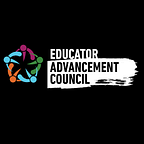What does it really feel like to learn from and listen to a teacher’s experience?
A teacher was talking about what she needs, and she pointed to her bookshelf. On the shelf, there were at least ten large binders that she explained were filled with professional learning material. She had spent 15 years in trainings, gathering the information, and practicing her craft. But she said, “I’ve never had the time or space to actually dig into these and share my learnings with other folks. We don’t do that here.”
Of course, moments like these are incredibly revealing and hold wisdom about what we need to do next.
Why would we not tap into a teacher’s years of experience?
Instead, we have seen decades of a culture where teachers are held responsible and blamed for disconnected performance standards without the necessary time, resources, and support to learn, share, iterate, and reflect on promising practices. It’s everywhere, and the history of this negative culture was recently discussed in this Have You Heard podcast episode. It’s even on Tik-Tok; This is especially as educators felt criticized during school reopening. What would it look like if we instead provided the necessary supports, tools, processes, and connections to build on the strengths of our educators instead of focusing on deficits?
We’ve been living in a system that sets teachers up to experience greater challenges than they can surmount, instead of a system that creates the conditions for teachers to be their most empowered selves.
Have we asked educators what they need?
EAC’s coordinating bodies are composed of 51% educators because the people tasked with making decisions desperately need time and space to re-center their knowledge and experiences as drivers of this work. What do educators need and how do we build on their strengths to initiate and support good ideas in a very practical way at ground level?
Prior to Regional Educator Networks, there were no consistent statewide initiatives where teachers were invited to guide the design and implementation of systems change to better support and diversify the educator workforce. There have been so few spaces where teachers can go to dream, analyze relevant data, and make decisions that directly impact the teaching profession. Yes, we have unions which are so important, but they serve a very different and vital purpose. Yes, we have other statewide initiatives focused on educators but none honor, connect, and build on the strengths of educators like the RENs.
As a leader, as a teacher, as a business owner, or whatever role and experience folx bring to the REN’s Coordinating Body, we are proud of what you’ve already accomplished simply by being together for this purpose, strength-to-strength.
Dr. Daniel Ramirez, Interim Executive Director, Educator Advancement Council
